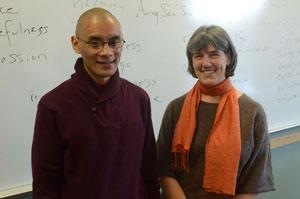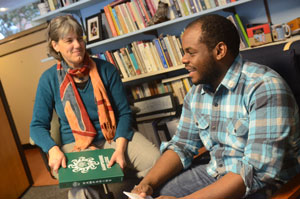Sue Darlington: Trees, Monks, and Interdisciplinary Teaching
 Sue Darlington loves to teach in the classroom. But she knows that what's really valuable to Hampshire students is the knowledge she brings from outside it.
Sue Darlington loves to teach in the classroom. But she knows that what's really valuable to Hampshire students is the knowledge she brings from outside it.
The professor of anthropology and Asian studies spent part of her fall 2010 sabbatical in Thailand, continuing decades-long research into the involvement of Buddhist monks in environmental conservation work. That research forms the basis of her soon-to-be-published book, The Ordination of a Tree: The Buddhist Environmental Movement in Thailand.
Tree ordination, in which Thai Buddhist monks symbolically ordain trees as monks in a variation of a traditional ritual, is intended to get local people to commit to preserving forests and adopt a sustainable form of agriculture. Darlington notes that, while Buddhist monks aren't supposed to be concerned with worldly issues, these "ecology monks" believe that combating environmental destruction is an important part of their mission to alleviate human suffering.
"The monks are trying to change farming and agriculture methods, and get farmers out of debt with seed companies," says Darlington. "The ritual is used to get villages engaged and committed. They don't really think they're turning the trees into monks. They're using it symbolically to try and influence people's behavior."
Darlington returned to the Thai villages that she has been visiting since the early 1990s. She saw once again that the influence of particular monks, and not just the Buddhist institutions alone, have made the biggest difference in the project's success.
"The presence of active, involved, charismatic monks has been important, it keeps commitment high," says Darlington, who was finally told after years of questioning exactly what texts were used in the tree ordinations. "The monks really adapt the rituals to the audience. I learned that how they select verses is based on the people and issues involved."
Back on the Hampshire campus, Darlington's two spring semester classes deal with similar matters of religion and environment. After her sabbatical, she was excited to work with students again.
"There's a give and take between us. In every class, I ask my students what they would change if they had to teach the class the next year. Interesting ideas come out of those conversations; it gets me to rethink pieces of these courses." Darlington has two teaching assistants in her course Environmental Justice in the Age of Climate Change. Baldwin Scholar Anthony Thomas 08F has focused on environmental racism and local environmental efforts at Hampshire, while Brendan Sweeney 07F is investigating the difference between climate and climate justice for his Division III. She hopes to take the class on a trip to Thomas's neighborhood in the South Bronx, where he has been involved in local environmental efforts and community organizing since he was 12.
Darlington has two teaching assistants in her course Environmental Justice in the Age of Climate Change. Baldwin Scholar Anthony Thomas 08F has focused on environmental racism and local environmental efforts at Hampshire, while Brendan Sweeney 07F is investigating the difference between climate and climate justice for his Division III. She hopes to take the class on a trip to Thomas's neighborhood in the South Bronx, where he has been involved in local environmental efforts and community organizing since he was 12.
"Anthony focuses domestically and Brendan internationally, which really helps what we're trying to do with this class," says Darlington, who is on Thomas's Division II committee.
Her other spring semester course, Buddhism and Society in Asia, allows her to spend some time with Buddhist monk Lama Trinley Chewang. At the request of the Dalai Lama, a collaboration between Hampshire and Smith Colleges and the Tenzin Gyatso Institute in Berne, New York gives up-and-coming Buddhist leaders access to Western educations. The first monk, Lama Trinley, arrived in the fall, and he is auditing Darlington's class. Two more plan to join him on campus in the fall of 2011.
"I'm the point person at Hampshire along with the global education office. Eventually Lama Trinley will run meditation lessons and possibly teach the Tibetan language," says Darlington. "He's high ranking in the monastic system, and he's learning Chinese as well from Hampshire's visiting Chinese scholars."
This program is distinct from Hampshire's long-term Tibetan Studies program, which brings a Tibetan student from India on full scholarship each year for four years. Darlington acts as the informal (and often official) advisor for these students as well. Working closely with them provides her with different perspectives on many of the things she teaches, including Buddhism, environmental studies, Asian studies, and even film and anthropology.
An environment built on interdisciplinary academic research brought Sue Darlington to Hampshire. She's glad to see that each semester continues to give her a chance to approach it in new, challenging ways. That's a key reason why she supports the Hampshire Fund.
"I myself regularly give to the Hampshire Fund, especially in support of financial aid and the Tibetan student scholarships," says Darlington. "Not only does this strengthen diversity on campus, but I see it as another statement of my commitment to Hampshire's mission and the multicultural values that inform my teaching."

